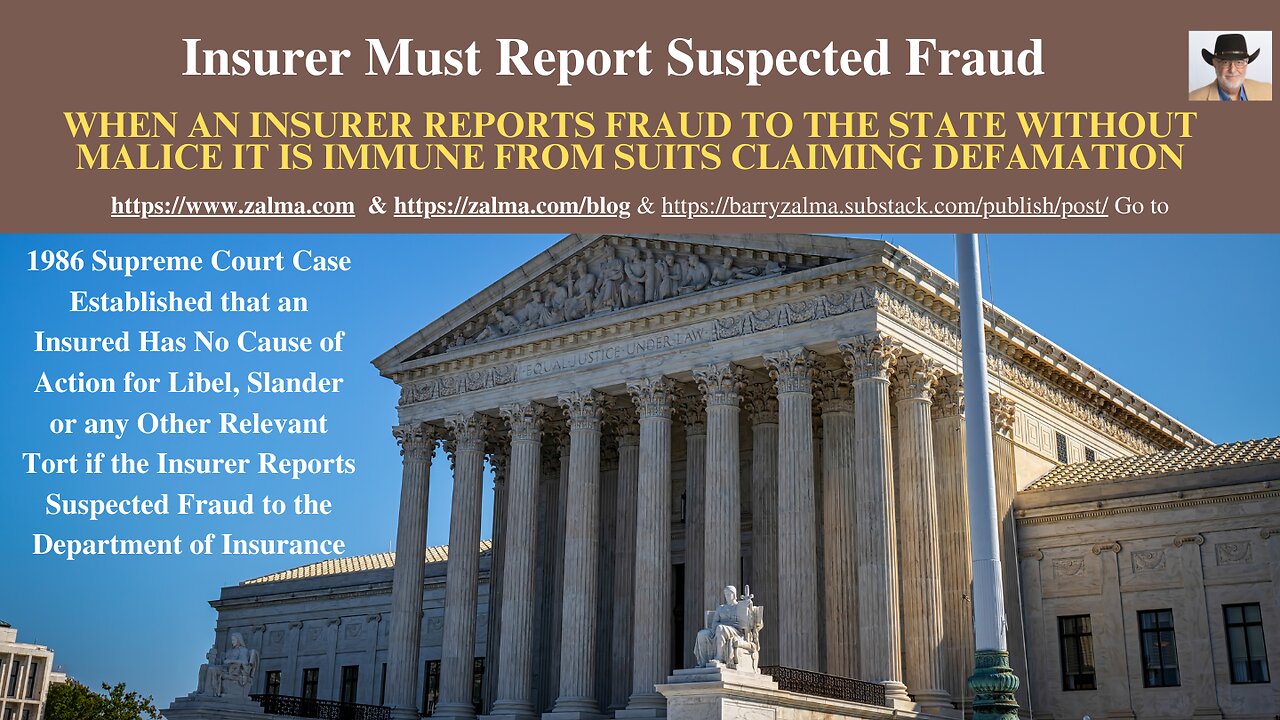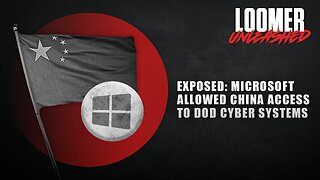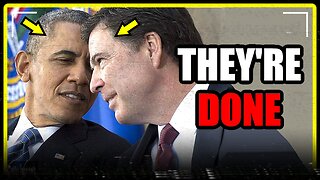Premium Only Content

Insurer Must Report Suspected Fraud
When an Insurer Reports Fraud to the State Without Malice It is Immune From Suits Claiming Defamation
No Cause of Action for Libel, Slander or any Other Relevant Tort
Post 4761
Justice Broussard writing for the California Supreme Court dealt with a case where the plaintiff obtained a judgment for $15,271 in general damages, $250,000 for emotional distress, and $1.25 million for punitive damages in an action for misconduct of an insurer in dealing with a claim for stolen property. The principal issue raised is whether the insurer's report to the Bureau of Fraudulent Claims (hereinafter Bureau) was privileged so as to preclude recovery for injuries sustained as a result of a criminal proceeding.
In Clydelho Frommoethelydo v. Fire Insurance Exchange et al., S.F. 24881, 228 Cal.Rptr. 160, 42 Cal.3d 208, 721 P.2d 41, Supreme Court of California, In Bank (July 24, 1986)
Rehearing Denied September 25, 1986.
The Supreme Court concluded that the report was privileged and that while it affirmed the judgment to the extent of the value of the property stolen, $8,871, less the $100 deductible, the judgment should be reversed as to the additional damages.
FACTS
In August 1978, plaintiff's home was burglarized, and he submitted a claim for $17,185. The insurer ultimately paid $10,784. In late June 1979, the house was burglarized again. Plaintiff claimed a loss of $8,871, including $3,000 for stereo and video equipment he claimed was bought from Matthew's TV and Stereo. Plaintiff attached a pink copy of a bill of sale to his sworn proof of loss. The copy was one page of a five-page form. The date "1/03/79" appeared in handwriting in the upper left-hand corner, but the cash register printout date on the right-hand side had been erased and obliterated. The other four copies of the bill of sale had a cash register printout date of "7/19/79," which was after the second burglary.
The Bureau determined to investigate and assigned one of its senior investigators who concluded that it appeared that insurance fraud had occurred in violation of Insurance Code section 556. Plaintiff was arrested at the fire station where he worked in March 1980 by the investigator.
Plaintiff's attorney subsequently convinced the deputy district attorney that the latter could not prove beyond a reasonable doubt that the claim, as opposed to the receipt, was false. The deputy district attorney dismissed the criminal charges on September 8, 1980, the morning of trial. The insurer was not advised of the existence of the witnesses until after dismissal of the criminal charges.
The jury found for plaintiff on the causes of action for breach of the duty of good faith and fair dealing, breach of fiduciary duty, and violation of section 790.03.
DISCUSSION
A covenant of good faith and fair dealing is implied in every insurance contract. Insurance Code section 12992 provides that an insurer "which believes that a fraudulent claim is being made shall, within 60 days after determination by the insurer that the claim appears to be a fraudulent claim, send to the Bureau of Fraudulent Claims, on a form prescribed by the department, the information requested by the form...."
Section 12993 provides that an insurer shall not be subject to civil liability "for libel, slander or any other relevant tort cause of action by virtue of the filing of reports, without malice, or furnishing other information, without malice, required by this article or required by the commissioner under the authority granted in this article."
The Supreme Court noted that when the insurer reported to the Bureau, the facts known to the insurer provided a reasonable inference of insurance fraud.
Compliance with a statutory duty to report and furnish does not provide a basis for tort liability so long as the information is accurate and complete. A true and complete report to the Bureau is not actionable.
The malice necessary to defeat a qualified privilege is "actual malice" which is established by a showing that the publication was motivated by hatred or ill will towards the plaintiff or by a showing that the defendant lacked reasonable grounds for belief in the truth of the publication and therefore acted in reckless disregard of the plaintiff's rights. (Roemer v. Retail Credit Co. (1975) 44 Cal.App.3d 926, 936 [119 Cal.Rptr. 82].
In almost every case if not every case where an insurer reports a claim believed to be fraudulent to the Bureau, the insurer stands to profit if the insured is successfully prosecuted. If ability to profit warranted a finding of malice, the insurer would be required to guarantee the accuracy of information obtained and to act at its peril whenever it reported information to the Bureau, and the statutory privilege would be meaningless.
The potential that the insurer may escape liability on the insured's claim is not sufficient to show malice. Rather, the requirement of malice in the statute must be viewed as a legislative determination that the insurer's pecuniary interest without more does not make the report actionable.
Once an insurer has evidence providing probable cause to believe an insurance fraud has occurred and determines to make a report to the Bureau, it may properly make its report, and the fact that the report is designed to secure prosecution does not show malice so long as the report does not contain known inaccuracies and is not incomplete.
Application of the duty to investigate to actions based on a report by an insurer to the Bureau would be in conflict with the privilege established by section 12993 for nonmalicious reports. The privilege applies unless the insurer acts out of hatred or ill will or in reckless disregard of the insured's rights. The Supreme Court concluded that when an insured seeks damages on the basis of an insurer's report to the Bureau, the privilege of section 12993 must take precedence over the ordinary duty to investigate. In the instant case, plaintiff has failed to present evidence that the insurer acted maliciously in making its report to the Bureau.
By awarding damages for economic loss, the jury obviously determined that plaintiff had suffered the loss. The judgment was affirmed insofar as it awards plaintiff $8,771. In all other respects it is reversed. Each side shall bear its costs on appeal.
ZALMA OPINION
The insurer, in good faith, complied with its statutory requirement to report to the state its suspicion that a fraud had been attempted. The Fraud Bureau (now the Fraud Division) found sufficient evidence to arrest the insured and at a Preliminary hearing a judge found there was sufficient probable cause to take him to trial. That the prosecutor got cold feet and dismissed the case on the day of trial is not evidence of any malice on the part of the insurer and the civil suit brought by the plaintiff failed because the insurer was protected by the privilege. Although this case is hoary with age it is the law of California while the statute numbers have changed.
(c) 2024 Barry Zalma & ClaimSchool, Inc.
Please tell your friends and colleagues about this blog and the videos and let them subscribe to the blog and the videos.
Subscribe to my substack at https://barryzalma.substack.com/publish/post/107007808
Go to X @bzalma; Go to Newsbreak.com https://www.newsbreak.com/@c/1653419?s=01; Go to Barry Zalma videos at Rumble.com at https://rumble.com/c/c-262921; Go to Barry Zalma on YouTube- https://www.youtube.com/channel/UCysiZklEtxZsSF9DfC0Expg.
Go to the Insurance Claims Library – https://lnkd.in/gwEYk
-
 LIVE
LIVE
TimcastIRL
34 minutes agoTrump Russia HOAX DECLASSIFIED, Obama Officials EXPOSED In “TREASONOUS CONSPIRACY”
13,994 watching -
 2:31:18
2:31:18
Laura Loomer
3 hours agoEP134: EXPOSED: Microsoft Allowed China Access To DOD Cyber Systems
62.2K36 -
 LIVE
LIVE
SpartakusLIVE
3 hours agoFriday Night HYPE || WZ Solos, PUBG, and maybe even OFF THE GRID?!
385 watching -
 9:43
9:43
MattMorseTV
3 hours ago $0.32 earnedTulsi just DROPPED a BOMBSHELL.
4922 -
 58:41
58:41
BonginoReport
8 hours agoTrump Impersonations & Friday Fun w/ Shawn Farash - Nightly Scroll w/ Hayley Caronia (Ep.93)
65.7K18 -
 LIVE
LIVE
The Mike Schwartz Show
8 hours agoTHE MIKE SCHWARTZ SHOW Evening Edition 07-18-2025 with guest Congressman Buddy Carter!
4,179 watching -
 LIVE
LIVE
FusedAegisTV
4 hours agoRumble Smackdown! #004 Tekken 8 $100+ Online Tournament !bracket !prizepool
88 watching -
 1:03:43
1:03:43
Sarah Westall
2 hours agoPlanning is Over, War has Started: First Stage of Economic Global War: Commodities w/ Andy Schectman
3.88K -
 LIVE
LIVE
BSparksGaming
11 hours agoDonkey Kong BONANZA Walkthrough Gameplay! (Part 2)
107 watching -

LFA TV
22 hours agoLFA TV ALL DAY STREAM - FRIDAY 7/18/25
164K25